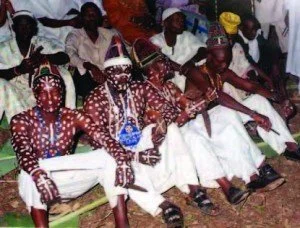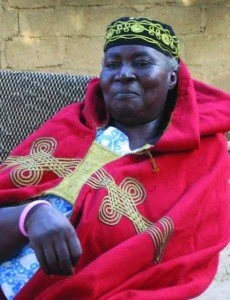Defending An Honorable Legacy: The Real Black History
Burkina Faso( which means "Land of Upright People") is home to the Mossi. This region is home to many cultures that have been preserved despite the onslaught of colonialism
Each year when February comes back around, the mainstream American culture somehow manages to get away with promoting "black awareness" through learning, remembering, and celebrating "black history," while continuing to promote the same exact "black heroes" and "black history milestones" over and over again. But as unfortunate as it may sound, the origination of black history month really only has room for the acknowledgment of the history of blacks from the point of enslavement to the present.
In 1926, what we know today as "black history month" emerged as as "negro history week," and was set during the shared birthday-week of two men who were thought to be very important people in the lives black Americans - Abraham Lincoln, and Frederick Douglas. Dr. Carter G. Woodson, a black American who was the son of former slaves, established the custom as a way to fight to get the presence of black Americans written into the history of the nation.
Just over 80 years after its establishment, in conjunction with a supposedly remarkable trail of milestones in the progression of blacks in this nation, we are still only left with two things: the men and women who fought and died for blacks to gain acknowledgment in a system that continues to oppress them, and a time line for our people that begins in 1619 when the first blacks arrived (as slaves) in America. These people and events in the short life of black American history are what we are to be aware of, remember, and celebrate. For the average black American, "black history" is restricted to the slave experience and the struggle to gain a respectable status in the eyes of white America.
Naaba Sagha, Interim Emperor of the Mossi
But our history extends far beyond the exploitative endeavors of European colonizers. Not only black Americans, but all of mankind, are descendants of the rich traditional culture that mothered all civilizations on earth. While Europeans were fearing sea monsters, bathing once a month, and devising schemes to steal wealth and property that did not belong to them, the traditional peoples of Meritah (traditional Africa) were navigating across the world, trading, building schools, developing sciences, and laying down the foundation that all modern systems have now either adopted or stolen. The traditional culture of our heritage has been passed down by ancestors for generations is still living throughout Meritah, and is even alive in the old stories, practices, and beliefs that were upheld in slave culture, and that are seen in black American culture today. Traditional black cultures are at the root of all human history, thus true awareness, knowledge, and celebration of black history cannot be reached without acknowledgment of traditional origins.
What contributes to the value of traditional culture, is the way that it is kept alive. Traditional culture has been maintained orally since the beginnings of human existence. Vividly expressed through song, dance, ritual and ceremony, and family and community life, oral traditions have formed the roots of all cultures and have been admired, studied, and even exploited by the handfuls of modern societies that cannot help but recognize their beauty and value. The elements that accentuate oral tradition are important pieces that build the richness of a culture. Songs that tell stories of bravery, maturation, life tribulations, and heritage are sung by adults and shape the perspective of children from a young age. Clothing, jewelry, and traditional make-up that are worn during rituals, ceremonies, and in day-to-day life remind all in the community of the beauty, strength, authority, and unity that defines their culture. Instruments that are played engrave the melody of heritage in the hearts of each community member.
The power of oral tradition has been greatly overlooked and even degraded in the confusion of modern society. However, the spread of knowledge and culture from one generation to the next (through Priests, Elders, story-tellers and parents) provides an individual with social qualities and awareness that many in modern society cannot visualize. By learning through an oral tradition, each individual receives a sense of social bonding, unification, cultural values, language, and practices that cannot be captured in any book - nor can it be reduced to a handful of "heroes" and "milestones." It is this tradition that is the root of black history, a tradition which has been systematically diminished by colonization and replaced with the "history" of enslavement. How much longer can we allow the history of our oppression to replace the legacy that belongs to us, the real black history?
Defending an Honorable Legacy: The Richness of Tradition Forming the largest ethnic group in the country of Burkina Faso in Meritah, the Mossi people have thrived for generations. Originally coming from the union of Dagomba royalty and Mende lineage, their culture has been growing since long before European colonization up to today. Just like many other traditional cultures of Meritah, the Mossi culture has been fortified and kept alive through an oral tradition.
The Mossi oral tradition is upheld in the family structure, which is the most important aspect of their culture. The family is the most important to traditional people because it is the family that provides an individual with their stability, their protection, and an awareness of their identity. For Mossi people, an individual identity cannot be separated from the family and the collective unity of the entire community. The Mossi live in an ordered system that reflects the greatness of the first ancient kingdoms of our heritage.
This Mossi Elder represents the rich heritage found in Burkina Faso
Each family member has an important role to play in the maintenance of their values and culture. Within their community, elders are respected as the first and final authority - they must be consulted before any individual may make important decisions, they stand as the deciding authority when someone does something wrong in the community, and they even decide how land will be used by the families within the community. In a Mossi family, the father stands as the head (leader, organizer, adviser), or king, with his wife standing as the queen and backbone of the family - maintaining the fields and providing food and care for all , educating, and passing duties and responsibilities down to each child. Each child then holds responsibilities for the siblings who come after him. Aunts and uncles take responsibility for educating and disciplining children, and each person in the society is aware of their responsibility to one another. It is through the structure of the family that the oral tradition remains efficient.
Holding such a high value for the family within their hearts, it is clear that the the Mossi peoples' acknowledgment of their ancestors is at the center of their tradition. Spiritual rituals and ceremonies are conducted by the Mossi using elaborate dance, masks, and music to acknowledge their ancestors. The ancestors, the past relatives who have been raised to a high rank in the World of the Dead world of the dead, are recognized as the influencing force in our lives - they are the entities that can impact the events and experiences in the life of each individual depending on his or her actions. So, it is the ancestors who the Mossi raise their respect, honor, and prayers to in their spiritual activities.
Similar to practically all other traditional peoples, the Mossi recognize that without family and ancestors the individual is nothing. The life of Mossi people is focused around the development of the self through spiritual activity and acknowledgment of the ancestors, and the stability and upliftment of the family and community through adherence and remembrance of traditional culture. With the minds of each person committed to these aspects of life, the Mossi rise in dedication to the quality of their existence, and the prosperity of their way of life.
Today when we look at the traditional lands, cultures, and peoples of Meritah, the motherland of all humanity, we are forced to look through layers of destruction, devastation, exploitation, and corruption inflicted by the hands of European imperialism before we can see the ancient richness that was once dominant. We can see how the traditional cultures, like the Mossi, Bobo, Ashanti, Dogon, Kemetic, and Kushite, that mothered great and vast empires, are threatened under the grip of colonial rule. Before the French colonizers arrived to conquer the peoples of traditional Burkina Faso, the Mossi believed that the arrival of the first white faces in the land would bring death to the people and the culture. With the arrival of the French, the people of the land were submitted to centralized rule, slavery, taxation, and war.
Despite this troubling reality, the traditional Mossi are still thriving today. They have a ceremony that honors the fight put forth by their King against the colonial invaders. The ceremony, Mogho Naba, is performed as a reminder of the initial success of the Mossi King to deflect the might of colonial domination. Even today, the country and the people of Burkina Faso maintain a reputation of embodying a revolutionary spirit - remembering their rich legacy, and the people who stood to defend it.



